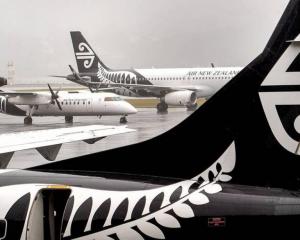
Simon Draper was a leading figure in New Zealand’s successful bid for a seat on the United Nations Security Council. Now, as the executive director of the Asia New Zealand Foundation, he is pushing the case for New Zealand to become more active in Asia. He speaks to business editor Dene Mackenzie.
Asia New Zealand Foundation executive director Simon Draper is no stranger to the machinations of diplomatic relations.
As a leading figure in New Zealand's successful bid for a seat on the United Nations Security Council, he was involved in dealing with a myriad of problems and solutions.
In an interview with the Otago Daily Times, Mr Draper said the strongest support for New Zealand's bid came from Asia and he had to ask himself what it was about this country that made it so interesting to Asia.
In his new job, he wanted to help New Zealanders understand more about Asia and the fact it was not one country, and it was more than China.

The foundation had research which showed New Zealanders felt strongly that Asia was important to the future of the country, but 60% of people said they knew nothing about the region.
"We decided to test it and found it was true. The average mark for questions about Asia was two out of six. These were not rocket science questions.''
He said one question was: which country does the Mekong River flow through? Another was about the main religion of Indonesia.
More concerning, people aged 30 and under had even less knowledge of Asia, despite Bali being a tourist destination.
Only one in six had a general knowledge about Asia.
The survey of 2000 people was conducted by Colmar Brunton.
The perception towards Asia in New Zealand was changing, Mr Draper said.
School leavers were showing a declining interest in Asian affairs and although 20% of school pupils were of Asian descent, they were losing their Asian heritage. When they entered school they were bi- or tri-lingual but left as mono-lingual.
He also questioned whether enough was being done to keep relationships strong with Asian graduates from the Otago Medical School and the University of Otago Faculty of Dentistry.
Mr Draper spoke to the Otago Chamber of Commerce yesterday following a speech to the 53rd Foreign Policy School at the weekend.
When it was put to him the importance of trade to this and other regions of New Zealand had been pushed for decades, he said it came down to belief.
Businesses had to believe the region was important and they needed to make the effort.
Asians in New Zealand had the reputation for being entrepreneurs and starting their own businesses.
"They have to start their own because New Zealanders don't employ them. We have a lot of Asians in New Zealand but we are not valuing them enough.''
The foundation had taken more than 450 journalists to Asia, along with teachers and business interns, in an effort to raise awareness.
New Zealand also had a working holiday scheme with countries around the world for those aged 35 and under.
There were 150 holiday scheme places available for New Zealanders to go to Vietnam, he said.
"The Vietnamese side sells out, gone in a minute. From New Zealand, we had one application.''
The chamber members were asked how they could encourage young people to be more interested in Asia as a way of growing their businesses.
Dunedin did not have to trade with China. It could trade with Shanghai, its sister city, such was the size of the market, Mr Draper said.
Asked about the difficulties in dealing with China, and some of the high profile failures, Mr Draper said the time scales of Asia and New Zealand were different.
New Zealanders wanted to have results quickly when Asia had much longer time horizons. Building relationships was important and cultural exchanges would help.
"It's different doing business there and if you don't understand the differences you can be frustrated. It is about knowing your customer.''












